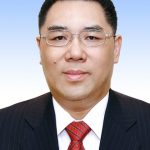 The Chief Executive, Mr Chui Sai On.
The Chief Executive, Mr Chui Sai On.
The Chief Executive, Mr Chui Sai On, today called on Macao people to transform their love for Macao into a driving force for the development of a more prosperous city.
In his New Year Message delivered today, Mr Chui said the Government would continue to perform its duties in a diligent and courageous way, and would make its best effort to successfully face any challenges that might arise in 2018.
In the coming year, the Government would spare no effort to propel the city’s economic development, and to improve the city’s governance and the well-being of the community, in order to make Macao a better home for everyone.
The year of 2017 was a year in which Macao people showed a resolute and tireless spirit. It was also a year that provided the community with difficult experiences from which lessons were learned, stated Mr Chui.
In August, Macao was battered by Typhoon Hato – the strongest recorded storm in Macao since 1953, causing 10 human fatalities as well as resulting in heavy economic losses.
Mr Chui praised the strength and perseverance that Macao people displayed while dealing with the aftermath of Typhoon Hato, noting that the city had not been hit by a natural disaster of such proportion in many decades. He spoke highly of the support provided by the Central Government and other mainland authorities to relief work to alleviate the impact of Typhoon Hato and restore normality in Macao.
The storm did not undermine the Government’s determination and commitment to making Macao a better home for everyone, stressed Mr Chui.
The Government established, immediately after the typhoon, the Commission for Reviewing and Monitoring the Improvements of the Response Mechanism to Major Disasters, in order to review the city’s disaster response mechanism system.
In the year ahead, the Government would prioritise tasks related to making Macao a safer place, including: to create a long-term mechanism for preventing and mitigating public emergencies; to optimise the city’s infrastructure; to improve the response mechanism in case of public emergencies via short-, medium-, and long-term measures; and promote further safety awareness among the general public.
Reviewing 2017’s achievements, Mr Chui noted Macao maintained steady economic growth, healthy public finances and a high employment rate. The strong support from the Central Government continued to be crucial to the city’s ongoing achievements, he added.
To boost the city’s development further, Mr Chui said the Government would strictly adhere to the “one country” principle while taking full advantage of the benefits offered by the “two systems” model.
In 2017, the Government established the Working Committee for the Development of “Belt and Road” initiative to advance Macao’s contribution to the development of the country’s Silk Road Economic Belt and the 21st-Century Maritime Silk Road (collectively known as the “Belt and Road” initiative).
The Government is also committed to the development of the Guangdong-Hong Kong-Macao Greater Bay Area, and to the integration of Macao’s strategic goals with the country’s development strategies. Such goals included the transformation of Macao into a world centre of tourism and leisure, and a commercial and trade cooperation service platform between China and Portuguese-speaking countries (collectively known as the “Centre and Platform” policies).
On behalf of the Government, the Chief Executive extended his sincere wishes of a prosperous New Year to the Macao public. Mr Chui also expressed gratitude to residents and public servants, in particular those who had to work round the clock to provide services during the holiday period.


